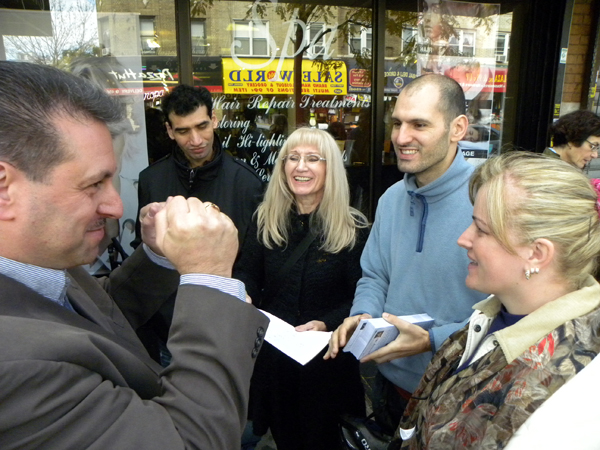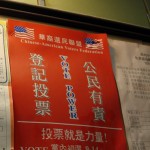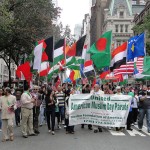
Anna Dziubek and Donna Klimas, Polish immigrants and members of Local 32BJ SEIU, speak to a potential voter in Maspeth, Queens. (Photo: Ewa Kern-Jedrychowska)
Last Saturday the weather seemed perfect. It was warm and sunny, not a breath of wind. But Donna, who had been canvassing for various candidates for many years, was not too happy about it. “People may not be at home,” she worried as they walked along the quiet and tight-knit block of 56th Road in Maspeth, right by the Polish parish of the Holy Cross.
Nevertheless, some residents were around, smoking cigarettes on their porches, raking leaves around their houses or chatting in front of the church. Canvassing can be a challenging task, but the volunteers are specially trained on how to talk to people and how to explain the issues to potential voters. Their speech to the Maspeth residents was simple. “We represent labor union 32BJ, we clean up offices in Manhattan. We are here to encourage you to vote for Senator Joe Addabbo because he cares for working people like you and me, and for small businesses that we Poles run here in Maspeth,” they would say in Polish.
A few residents said they were not eligible to vote. Others asked questions about Election Day. Some grabbed a handful of flyers, saying they would pass them on to neighbors. Donna, who campaigned in the Ridgewood-Maspeth area for Addabbo in 2008, said language ability was a crucial factor in reaching voters in the neighborhood. “I spoke with hundreds of Polish people, Polish people who speak only Polish,” she said. “I had a chance to explain to them how important it is, why we are doing it. […] If somebody let them know what’s going on, how important it is to vote, they start to realize that.”
It’s impossible to precisely assess unions’ impact on the outcome of elections. Union leaders argue that in addition to their 2 million members, they can also reach family members and friends whom they can potentially persuade.
But some immigrant members may not yet be eligible to vote. Not everyone follows the unions line and not everyone pays attention to the election the way Donna and Anna do. “If I don’t make it to the polling site, I’m not upset,” said another Pole, Cezaria Andrzejewski, 53, a certified nurse assistant from Staten Island and member of 1199SEIU, the health care workers union. She added that she doesn’t usually take into account a union’s endorsement and she doesn’t vote along party lines. “I discuss these things with my husband and we decide together,” said Cezaria. She hasn’t decided whom, if anybody, she will be voting for this year.

State Senator Joseph P. Addabbo (left) cheers on Donna Klimas (center) and the other union volunteers who are canvassing for his reelection campaign. (Photo: Ewa Kern-Jedrychowska)
Nevertheless, the New School’s Norman Adler argues that unions’ political activism brings measurable results. “There are always some members who will say ‘I don’t agree’ but it’s not an enormous number. We know by looking at the turnout figures for our union [32BJ] that we generally run between 7 and 10% higher in turnout than the general population.”
Just last year, union support had a significant impact on the race for city comptroller, when John C. Liu became the first Asian elected to citywide office, and Bill de Blasio won the race to be public advocate. Both races drew scant interest in the general population— and that meant unions were able to influence the outcome by mobilizing their people. Adler says that when there’s low turnout, each vote is more important. “As the union says to its members: “When you vote in a low turnout election you’re not making one vote, you’re making 2 or 3 votes.” Adler predicts that this may be the case in New York on November 2, as midterm elections historically have lower turnout.
For many immigrants in the union, working on political campaigns is sometimes the first time in their lives they’ve been engaged in the democratic process. That was Anna’s case—when she lived in Poland, she wasn’t involved with politics at all. But in the U.S., she got inspired after meeting Donna, whom she jokingly calls “mommy” because of their age difference. For Donna, it’s also about her ethnic group. “As a Polish person I believe the more of us go and vote and support the one’s who are standing by us we are getting stronger as a Polish community.”
Feet in Two Worlds coverage of the New York election season is supported by the New York Community Trust and the John S. and James L. Knight Foundation.




